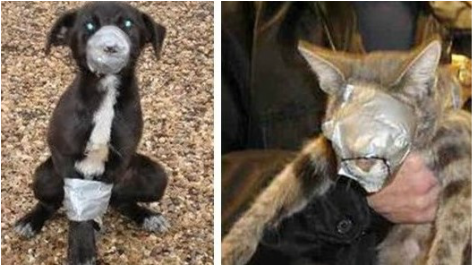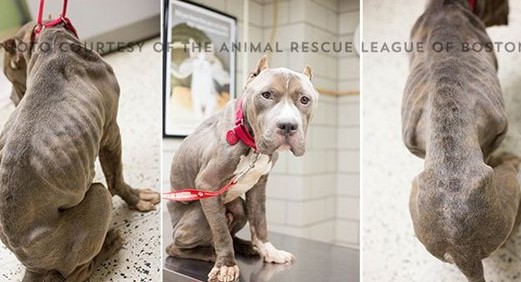Why Would Anyone Oppose an Animal Abuser Registry?
Answers to Common Objections
Answers to Common Objections
Animals after being given away online without a background check (Photos, Huffington Post)
Too often, pets are blindly given or sold to individuals with a history of willfully harming or egregiously neglecting animals. An animal abuser registry with consequences for all who fail to check it before selling or rehoming pets is the only way to protect them from being transferred to convicted abusers.
Some objections to these registries are based on misconceptions. Others serve the selfish best-interest of those who hand off animals--for profit or because they're unwanted--without consideration for their welfare.
OBJECTION: Those convicted of violating Massachusetts’ animal cruelty statute should be rehabilitated, not required to register.
REALITY CHECK: Registration as a convicted animal abuser and rehabilitation are not mutually exclusive! Convicted animal abusers should receive counseling. However, until a licensed mental health professional deems the individual rehabilitated, it is reckless to place vulnerable animals in his or her care. A registry with penalties for not checking it is the only way to prevent that.
OBJECTION: Registration as an animal abuser will prevent offenders from finding a job.
REALITY CHECK: Massachusetts’ existing animal cruelty statute prohibits convicted offenders from working with animals. A registry will not prevent these people from finding any other job. Think about it: If a business has no involvement with animals, why would it check an animal abuser registry as a precondition of employment?
OBJECTION: Convicted animal abusers deserve a second chance.
REALITY CHECK: Yes, convicted offenders do deserve a second chance. They'll receive it at the conclusion of the required registration period—or sooner. Coalition to Protect and Rescue Pets proposes that offenders who have received mental health counseling and been deemed rehabilitated by a licensed mental health professional may appeal for removal of their names from the registry.
However, convicted abusers who re-offend should remain on the registry for life as other registries require. This is important for the protection of animals—and because animal abuse is a well-documented predictor of other antisocial behavior, habitual offenders are also a danger to people.
OBJECTION: Animal abuser registries deny convicted offenders their privacy rights.
REALITY CHECK: Privacy is lost upon arrest, whether or not the individual is required to register—or is ever convicted. Hundreds of thousands of people receive the name, city or town of residence, and image of even alleged offenders from the news media without asking for it. Short of repealing the First Amendment, there's no way to protect offenders' privacy.
In contrast, to obtain information from an animal abuser registry, one must take action: search for a specific name or names, just as employers, landlords and others background check prospective employees, tenants and volunteers who work with vulnerable humans.
Some objections to these registries are based on misconceptions. Others serve the selfish best-interest of those who hand off animals--for profit or because they're unwanted--without consideration for their welfare.
OBJECTION: Those convicted of violating Massachusetts’ animal cruelty statute should be rehabilitated, not required to register.
REALITY CHECK: Registration as a convicted animal abuser and rehabilitation are not mutually exclusive! Convicted animal abusers should receive counseling. However, until a licensed mental health professional deems the individual rehabilitated, it is reckless to place vulnerable animals in his or her care. A registry with penalties for not checking it is the only way to prevent that.
OBJECTION: Registration as an animal abuser will prevent offenders from finding a job.
REALITY CHECK: Massachusetts’ existing animal cruelty statute prohibits convicted offenders from working with animals. A registry will not prevent these people from finding any other job. Think about it: If a business has no involvement with animals, why would it check an animal abuser registry as a precondition of employment?
OBJECTION: Convicted animal abusers deserve a second chance.
REALITY CHECK: Yes, convicted offenders do deserve a second chance. They'll receive it at the conclusion of the required registration period—or sooner. Coalition to Protect and Rescue Pets proposes that offenders who have received mental health counseling and been deemed rehabilitated by a licensed mental health professional may appeal for removal of their names from the registry.
However, convicted abusers who re-offend should remain on the registry for life as other registries require. This is important for the protection of animals—and because animal abuse is a well-documented predictor of other antisocial behavior, habitual offenders are also a danger to people.
OBJECTION: Animal abuser registries deny convicted offenders their privacy rights.
REALITY CHECK: Privacy is lost upon arrest, whether or not the individual is required to register—or is ever convicted. Hundreds of thousands of people receive the name, city or town of residence, and image of even alleged offenders from the news media without asking for it. Short of repealing the First Amendment, there's no way to protect offenders' privacy.
In contrast, to obtain information from an animal abuser registry, one must take action: search for a specific name or names, just as employers, landlords and others background check prospective employees, tenants and volunteers who work with vulnerable humans.
This starved dog was found abandoned on a cold January day in Dedham, Massachusetts. Should the person who caused his suffering be able to obtain another pet? (Photo, Animal Rescue League pf Boston)
OBJECTION: Massachusetts has no special-purpose registries for those who abuse children, seniors and individuals with disabilities. Why should there be one for animals?
REALITY CHECK: Whether or not there are registries for violent criminals who abuse humans has no bearing on the validity of establishing one for animals. It's not an all or nothing proposition; the legislature is supposed to consider proposed laws on their individual merit.
Fact is, animals are even more at risk for under-the-radar abuse than vulnerable humans. While some children, seniors and individuals with disabilities are abused behind closed doors, most are out in the community on an occasional if not daily basis. This provides opportunities for their abuse to be witnessed and reported. Abused children have also been known to appeal to neighbors for help.
Animals don't have that ability. And they don't show up at school, work or church with a black eye. It is vital that the Commonwealth provide a resource to keep them from being transferred to convicted abusers in the first place!
REALITY CHECK: Whether or not there are registries for violent criminals who abuse humans has no bearing on the validity of establishing one for animals. It's not an all or nothing proposition; the legislature is supposed to consider proposed laws on their individual merit.
Fact is, animals are even more at risk for under-the-radar abuse than vulnerable humans. While some children, seniors and individuals with disabilities are abused behind closed doors, most are out in the community on an occasional if not daily basis. This provides opportunities for their abuse to be witnessed and reported. Abused children have also been known to appeal to neighbors for help.
Animals don't have that ability. And they don't show up at school, work or church with a black eye. It is vital that the Commonwealth provide a resource to keep them from being transferred to convicted abusers in the first place!
This pet rabbit was kept in an outdoor cage, forced to stand on wire flooring 24/7 for years till her owners moved away and left her behind. By the time a neighbor rescued her, her feet were rubbed raw by the wire, causing a severe bone infection and sores that will never heal. Should these people be able to obtain another pet? (Photos: L. Nicotera)
OBJECTION: Someone caught “kicking the family dog” even once could be required to register.
REALITY CHECK: It is highly unlikely that a DA would prosecute or a judge would convict an individual who was seen kicking the family dog just once, though that obviously is unacceptable behavior. Next time, the victim could be a child.
OBJECTION: The requirement to register makes animal abusers more likely to re-offend.
REALITY CHECK: Mental illness, sociopathy and behavioral disorders such as inability to manage anger or control impulses are what cause animal abusers to re-offend. A registry keeps animals from being placed in these individuals’ hands until such time as a licensed mental health professional deems them rehabilitated, able to responsibly and humanely care for an animal.
OBJECTION: Someone with mental or cognitive impairment who has been convicted of animal abuse should not be on the registry.
REALITY CHECK: While there indeed is a distinction between the motivation of a mentally ill hoarder with too many animals to feed and that of a sadistic individual, the net result is the same: Animals suffer and die.
OBJECTION: There’s no evidence that registries would keep animal abusers from re-offending.
REALITY CHECK: No law is infallible. However, a registry with the requirement that everyone transferring companion animals check it would limit the number of animals convicted abusers could easily obtain. We can’t save all animals, but that shouldn’t stop us from trying to save all we can.
OBJECTION: If abusers can’t get animals in Massachusetts, they’ll go to another state.
REALITY CHECK: People can cross state lines to obtain guns that would be inaccessible in Massachusetts. Does that mean we should repeal Massachusetts’ strong gun laws? An animal abuser registry law, like any other law, will mitigate but not eradicate the problem it was enacted to address.
OBJECTION: Requiring pet stores to check the registry unfairly penalizes clerks who don’t do this and as a result, unwittingly sell animals to offenders in the database.
REALITY CHECK: Penalties will be assigned appropriately if legislation is drafted as Coalition to Protect and Rescue Pets proposes: We recommend a provision stipulating that the business which owns the animal—whether a pet store or breeding kennel—will be penalized, not the business’s employees. We also propose a similar provision exempting animal shelter employees and volunteers from penalties, while holding the shelter accountable. Requiring a photo i.d. for the purchase or adoption of an animal will help ensure that clerks are not deceived by abusers with aliases.
OBJECTION: Individuals selling or rehoming their pets or the animals’ offspring should not be held accountable for failure to check the registry because they may be unaware of the law.
REALITY CHECK: If all laws were held to the above standard, the legislature would not pass any that require compliance! Fact is, legislation creating an animal abuser registry would be communicated the same as any new law that carries penalties.
The 90 days between the governor’s signing and the law’s effective date would be a good time for the Commonwealth as well as stakeholders to disseminate information about the registry and its requirements via the news and social media, leaflets, signage and other communication channels. Stakeholders include municipal pounds; private, nonprofit animal shelters; animal advocacy organizations; pet store trade organizations; and breeders’ associations.
Copyright © 2016 Coalition to Protect and Rescue Pets. All Rights Reserved.
OBJECTION: Someone caught “kicking the family dog” even once could be required to register.
REALITY CHECK: It is highly unlikely that a DA would prosecute or a judge would convict an individual who was seen kicking the family dog just once, though that obviously is unacceptable behavior. Next time, the victim could be a child.
OBJECTION: The requirement to register makes animal abusers more likely to re-offend.
REALITY CHECK: Mental illness, sociopathy and behavioral disorders such as inability to manage anger or control impulses are what cause animal abusers to re-offend. A registry keeps animals from being placed in these individuals’ hands until such time as a licensed mental health professional deems them rehabilitated, able to responsibly and humanely care for an animal.
OBJECTION: Someone with mental or cognitive impairment who has been convicted of animal abuse should not be on the registry.
REALITY CHECK: While there indeed is a distinction between the motivation of a mentally ill hoarder with too many animals to feed and that of a sadistic individual, the net result is the same: Animals suffer and die.
OBJECTION: There’s no evidence that registries would keep animal abusers from re-offending.
REALITY CHECK: No law is infallible. However, a registry with the requirement that everyone transferring companion animals check it would limit the number of animals convicted abusers could easily obtain. We can’t save all animals, but that shouldn’t stop us from trying to save all we can.
OBJECTION: If abusers can’t get animals in Massachusetts, they’ll go to another state.
REALITY CHECK: People can cross state lines to obtain guns that would be inaccessible in Massachusetts. Does that mean we should repeal Massachusetts’ strong gun laws? An animal abuser registry law, like any other law, will mitigate but not eradicate the problem it was enacted to address.
OBJECTION: Requiring pet stores to check the registry unfairly penalizes clerks who don’t do this and as a result, unwittingly sell animals to offenders in the database.
REALITY CHECK: Penalties will be assigned appropriately if legislation is drafted as Coalition to Protect and Rescue Pets proposes: We recommend a provision stipulating that the business which owns the animal—whether a pet store or breeding kennel—will be penalized, not the business’s employees. We also propose a similar provision exempting animal shelter employees and volunteers from penalties, while holding the shelter accountable. Requiring a photo i.d. for the purchase or adoption of an animal will help ensure that clerks are not deceived by abusers with aliases.
OBJECTION: Individuals selling or rehoming their pets or the animals’ offspring should not be held accountable for failure to check the registry because they may be unaware of the law.
REALITY CHECK: If all laws were held to the above standard, the legislature would not pass any that require compliance! Fact is, legislation creating an animal abuser registry would be communicated the same as any new law that carries penalties.
The 90 days between the governor’s signing and the law’s effective date would be a good time for the Commonwealth as well as stakeholders to disseminate information about the registry and its requirements via the news and social media, leaflets, signage and other communication channels. Stakeholders include municipal pounds; private, nonprofit animal shelters; animal advocacy organizations; pet store trade organizations; and breeders’ associations.
Copyright © 2016 Coalition to Protect and Rescue Pets. All Rights Reserved.





